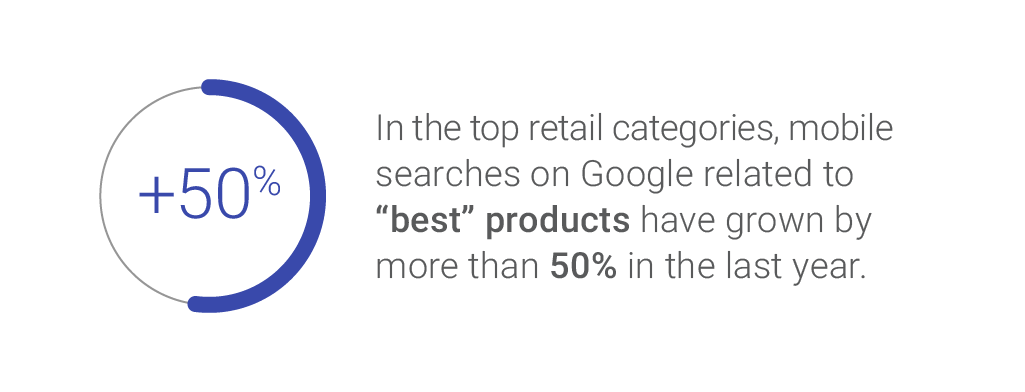Smartphones are fast becoming a search marketer’s best friend — or biggest concern. More than half of all searches on Google are conducted on a smartphone. In this critical holiday season, and in planning for next year’s, it’s time to take your mobile presence seriously for natural search and every other marketing channel you manage.
If you think mobile is a fad, consider that last year four in five smartphone owners turned to their smartphone to shop during those spare bits of time or while engaged in other pursuits, according to data from Google. Ecommerce businesses can no longer afford to ignore their mobile presence, or their mobile search marketing.
The intersection of ecommerce and mobile will likely be even more profitable this year. Consulting firm Kantar Retail has forecasted that online sales will increase 16 percent over last year. Some sources are predicting that mobile holiday purchases will outstrip desktop purchases this year for the first time.
And we know that search is a big part of mobile shopping.
Mobile Search Changes Shopping Plans

Google’s Inside AdWords blog reports that mobile searching on Google changes retailer and brand shopping plans for more than 75 percent of smartphone shoppers. Source: Google.
Even the big retailers that enjoy high brand recognition and preference aren’t immune to mobile search influence. Seventy-six percent of smartphone shoppers have searched Google and then decided to purchase from a different retailer or brand than they had planned, according to a report from Google.
In fact, more than 75 percent of smartphone shoppers reported being open to new retailers and brands online, even when they have a preference for shopping at the same brick-and-mortar stores. Moreover, over half of smartphone shoppers report discovering new businesses and products when searching on their phones.
This is good news for smaller retailers. Large retailers that have enjoyed a comfortable lead should take notice. Being able to compete in natural search will be a significant competitive advantage.
Smartphone Decisions Drive In-store Purchases

Sixty-four percent of smartphone shoppers search Google mobile before shopping at a physical store. Source: Google.
In addition to ecommerce sites, brands without ecommerce presences can benefit from increasing smartphone shopping activity. Consumers have been conditioned to think of a phone’s impact on physical shopping as limited to finding a store location or reading reviews while standing in the aisles. But Google’s data shows that 64 percent of smartphone shoppers looked to mobile search for ideas about what to buy even before they headed into the store.
These aren’t shoppers reacting to what they see on the shelves before searching. They are shoppers driven by mobile search to find a product in a store that they’ve already decided they’re interested in.
In this scenario, brands that market products on their sites and offer a “where to buy” feature can compete just as strongly as an ecommerce site.
For ecommerce businesses that also have brick-and-mortar stores, the connection between smartphones and physical store locations is even stronger. Mobile local search drives feet into the store to purchase: 76 percent of mobile searchers looking for something nearby visit a store that same day, with 28 percent of the searches culminating in purchase of a product, according to Google.
Mobile Searches for ‘Best’ Products Increase

Smartphone searches for “best” products have grown by more than 50 percent in the last year. Source: Google.
In search marketing, “cheap” keyword searches have long had a strong presence as themes that drive shoppers online. However, searches for the “best” products have grown by around 50 percent in the last year in the top retail categories, according to Google. This means that consumers are becoming more receptive to marketers’ claims of quality in addition to their typical quest for a good deal.
Last holiday, smartphone searches related to “best gift” grew 70 percent year over year while smartphone searches related to cheap or inexpensive gifts grew about 35 percent, according to Google. Smartphone searches related to “unique gifts” grew more than 65 percent while smartphone searches related to “cool gifts” grew a whopping 80 percent.
Many ecommerce marketers have had heartburn with targeting “cheap” searches on their site, fearing that it would degrade opinions of their products and prompt shoppers to head elsewhere. But false advertising restrictions around claiming that something is the “best” may make it equally difficult to target those searches on ecommerce sites.
To combat concerns over using “best” claims on your site, consider using customer quotes from your reviews or call center to boost the “best” or “cool” relevance signals that your ecommerce pages send. Read more in my article “Mining Reviews for SEO Benefit.”
It’s important to understand that just having a mobile presence isn’t good enough. Because search is such an integral piece of smartphone users’ behavior, your mobile presence must be optimized for performance in Google search. My article next week will explain how.




